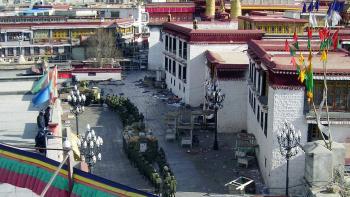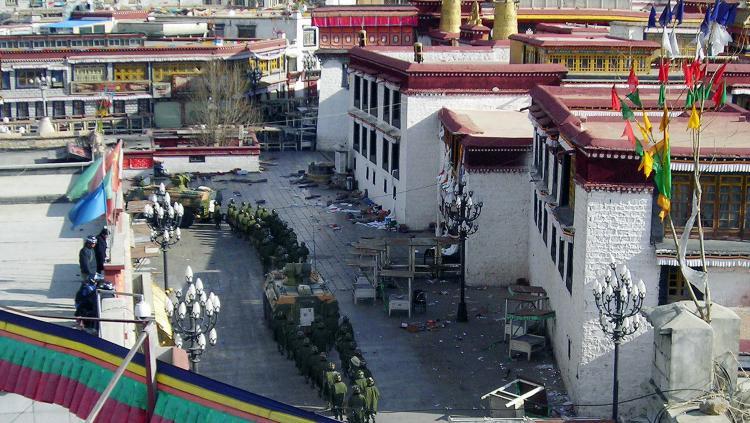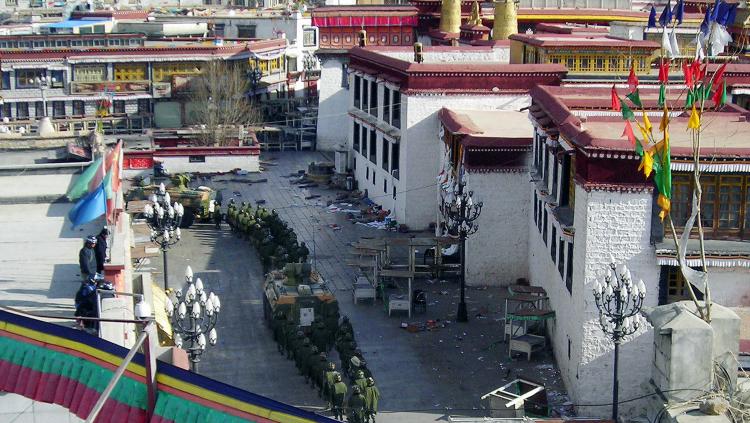BEIJING—The Dalai Lama’s calls for “high-level autonomy” for Tibet will never be accepted by Beijing, a Chinese official said, taking an unbending line before talks by exiled Tibetans about the future of their cause.
Reuters reported that Zhu Weiqun, a vice minister of the Chinese Communist Party’s United Front Work Department, said on Monday that envoys of the Dalai had pressed his long-standing demand for “genuine autonomy” for the mountain region during talks in Beijing last week.
Ahead of an agenda-setting meeting of exiled Tibetan activists, the Dalai’s representatives gave their Chinese hosts a “Memorandum for all Tibetans to enjoy genuine autonomy”. But Zhu’s public response was unyielding.
China would “never allow ethnic splitting in the name of genuine autonomy,” he told a news conference.
“In fact, this is seeking a legal basis for so-called Tibetan independence, or semi-independence or covert independence,” said Zhu, whose department oversees the ruling Party’s dealings with religious organisations.
His remarks were Beijing’s first detailed comment on the talks with envoys from Oct. 31 to Nov. 5, the ninth such discussions since 2002 and the first since the Beijing Olympic Games.
They also laid out the regime’s stance ahead of the meeting of exiled Tibetans, some of whom embrace more radical demands going beyond their 73-year-old leader’s ideas for autonomy.
“Contacts and talks failed to make progress, and they should assume full responsibility for it,” Zhu added, referring to last week’s meetings.
But the Chinese officials said the only point of the talks was to impress on the Dalai Lama that their government will not relax its hold on the region that saw massive protests, and brutal retaliation from Beijing,in March.
The Dalai’s demands for high-level autonomy for the region include ethnic Tibetan areas beyond the official Tibetan Autonomous Region. Zhu accused the Nobel Peace Prize winner of seeking “ethnic cleansing” across the whole area.
“If one day, he really seizes power,” he said of the Dalai, “he will without any compunction or sympathy carry out ethnic discrimination, apartheid and ethnic cleansing.”
The Dalai Lama fled into exile in 1959 after an abortive uprising against Chinese rule. He has since lived in India, travelling the world to promote his cause, and is still widely revered in his homeland.
He and other critics of China’s rule say it stifles religious and cultural freedom and promotes development that skews wealth and opportunities away from poor Tibetans while encouraging influxes of Chinese labour from other parts.
The Buddhist leader suggested this month his “middle way” for Tibet short of outright independence was failing, and speculation has grown he wants to step back from day-to-day political leadership after a bout of poor health.
He is not attending the Nov. 17-22 exiles meeting, perhaps a sign he wants to leave this debate to a newer generation.
Some exiled Tibetans believe the communists will take their demands seriously only if they shift to a more radical position, demanding outright independence.
But Zhu said his government’s version of ethnic autonomous regions, which gives little leeway for groups to challenge top-down controls, is “perfect” and needs no modification.
With Reuters
Reuters reported that Zhu Weiqun, a vice minister of the Chinese Communist Party’s United Front Work Department, said on Monday that envoys of the Dalai had pressed his long-standing demand for “genuine autonomy” for the mountain region during talks in Beijing last week.
Ahead of an agenda-setting meeting of exiled Tibetan activists, the Dalai’s representatives gave their Chinese hosts a “Memorandum for all Tibetans to enjoy genuine autonomy”. But Zhu’s public response was unyielding.
China would “never allow ethnic splitting in the name of genuine autonomy,” he told a news conference.
“In fact, this is seeking a legal basis for so-called Tibetan independence, or semi-independence or covert independence,” said Zhu, whose department oversees the ruling Party’s dealings with religious organisations.
His remarks were Beijing’s first detailed comment on the talks with envoys from Oct. 31 to Nov. 5, the ninth such discussions since 2002 and the first since the Beijing Olympic Games.
They also laid out the regime’s stance ahead of the meeting of exiled Tibetans, some of whom embrace more radical demands going beyond their 73-year-old leader’s ideas for autonomy.
“Contacts and talks failed to make progress, and they should assume full responsibility for it,” Zhu added, referring to last week’s meetings.
But the Chinese officials said the only point of the talks was to impress on the Dalai Lama that their government will not relax its hold on the region that saw massive protests, and brutal retaliation from Beijing,in March.
The Dalai’s demands for high-level autonomy for the region include ethnic Tibetan areas beyond the official Tibetan Autonomous Region. Zhu accused the Nobel Peace Prize winner of seeking “ethnic cleansing” across the whole area.
“If one day, he really seizes power,” he said of the Dalai, “he will without any compunction or sympathy carry out ethnic discrimination, apartheid and ethnic cleansing.”
Middle way
The Dalai Lama fled into exile in 1959 after an abortive uprising against Chinese rule. He has since lived in India, travelling the world to promote his cause, and is still widely revered in his homeland.
He and other critics of China’s rule say it stifles religious and cultural freedom and promotes development that skews wealth and opportunities away from poor Tibetans while encouraging influxes of Chinese labour from other parts.
The Buddhist leader suggested this month his “middle way” for Tibet short of outright independence was failing, and speculation has grown he wants to step back from day-to-day political leadership after a bout of poor health.
He is not attending the Nov. 17-22 exiles meeting, perhaps a sign he wants to leave this debate to a newer generation.
Some exiled Tibetans believe the communists will take their demands seriously only if they shift to a more radical position, demanding outright independence.
But Zhu said his government’s version of ethnic autonomous regions, which gives little leeway for groups to challenge top-down controls, is “perfect” and needs no modification.
With Reuters







